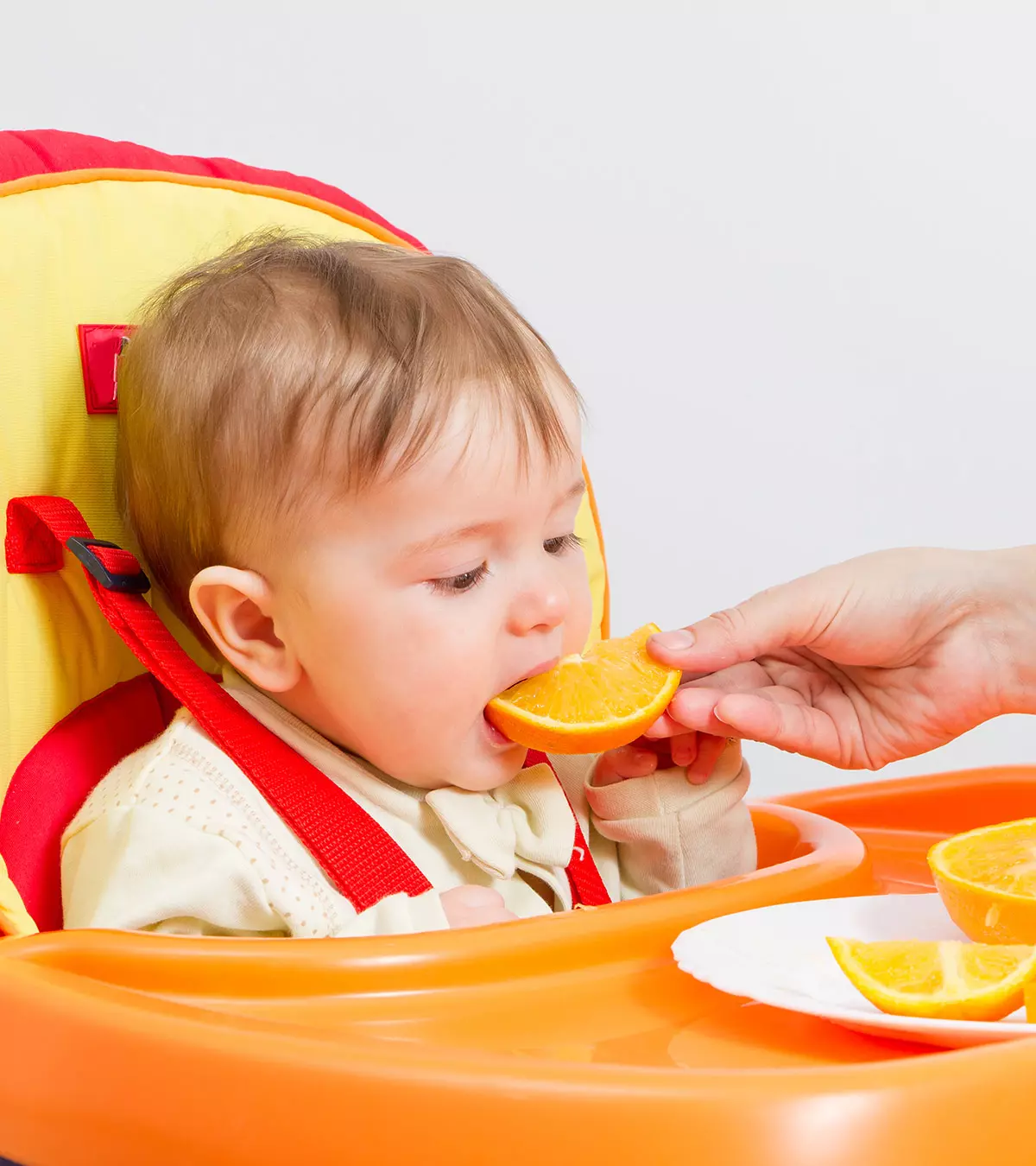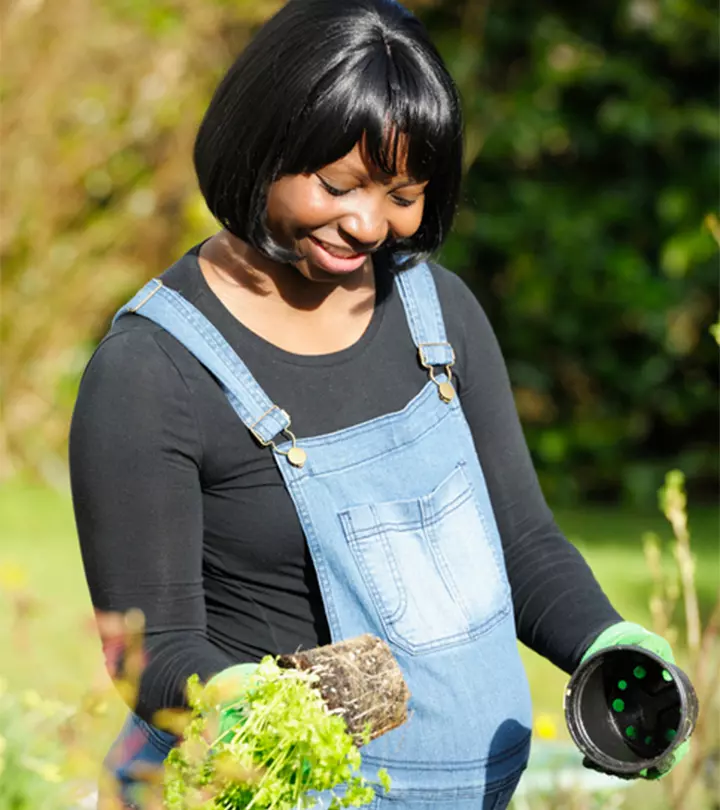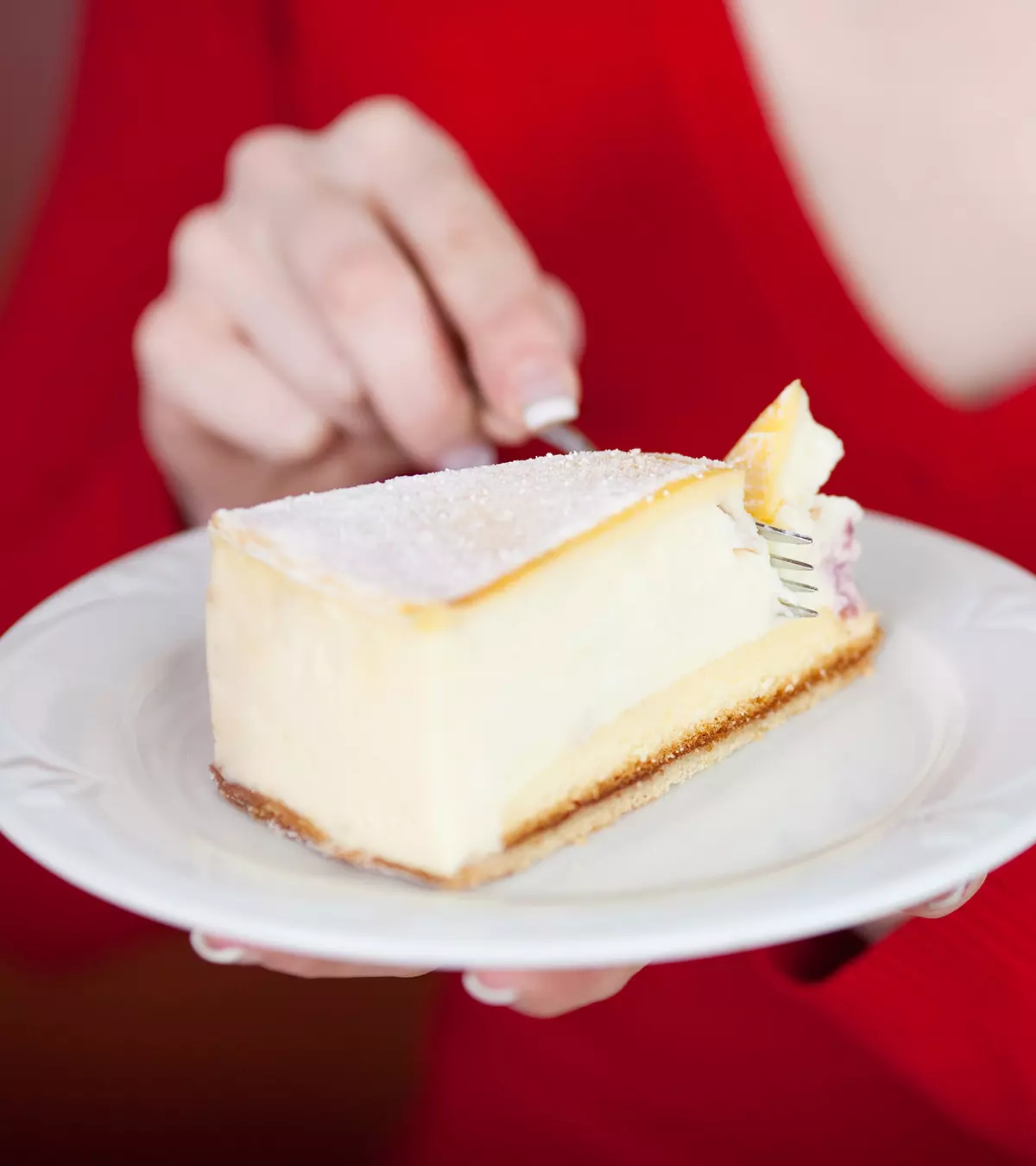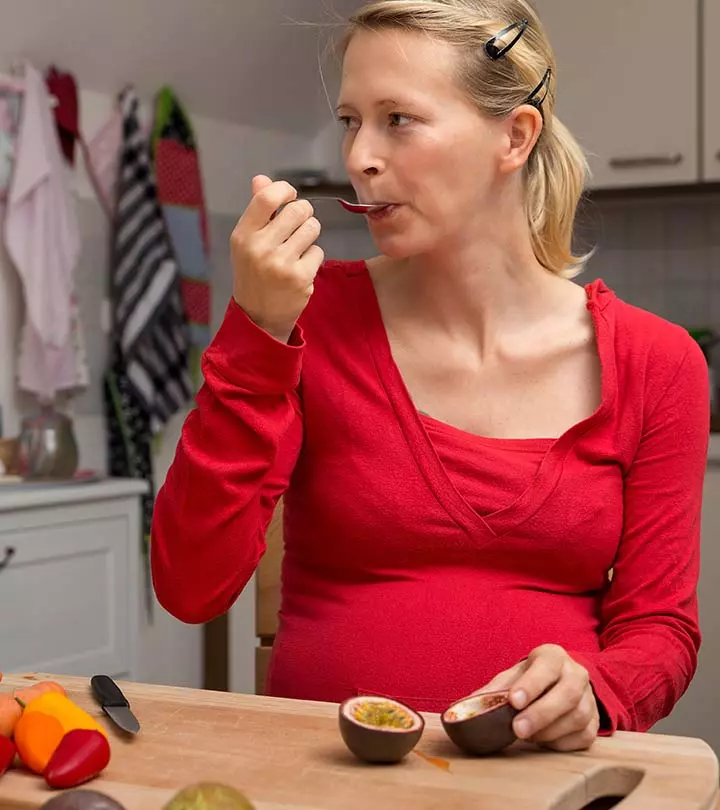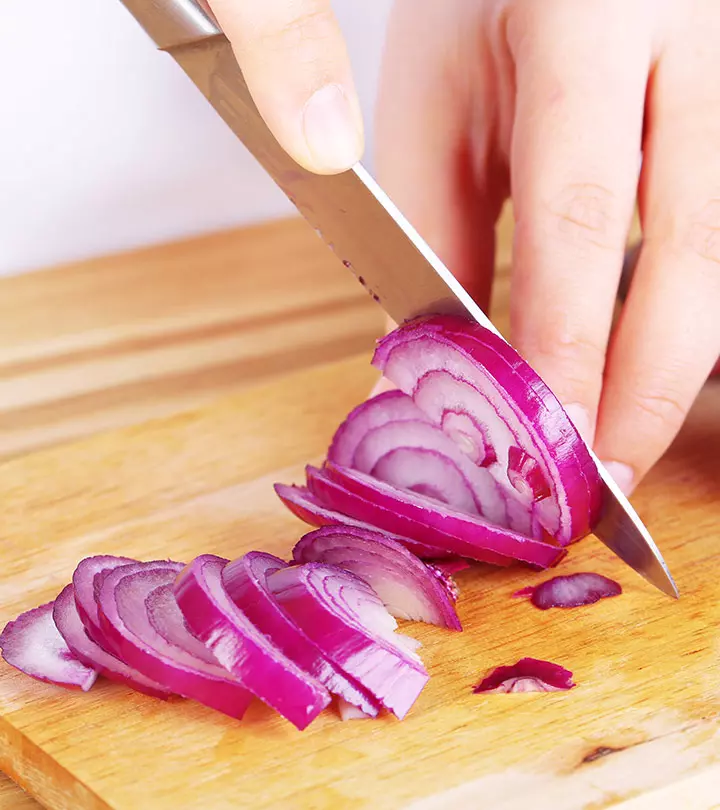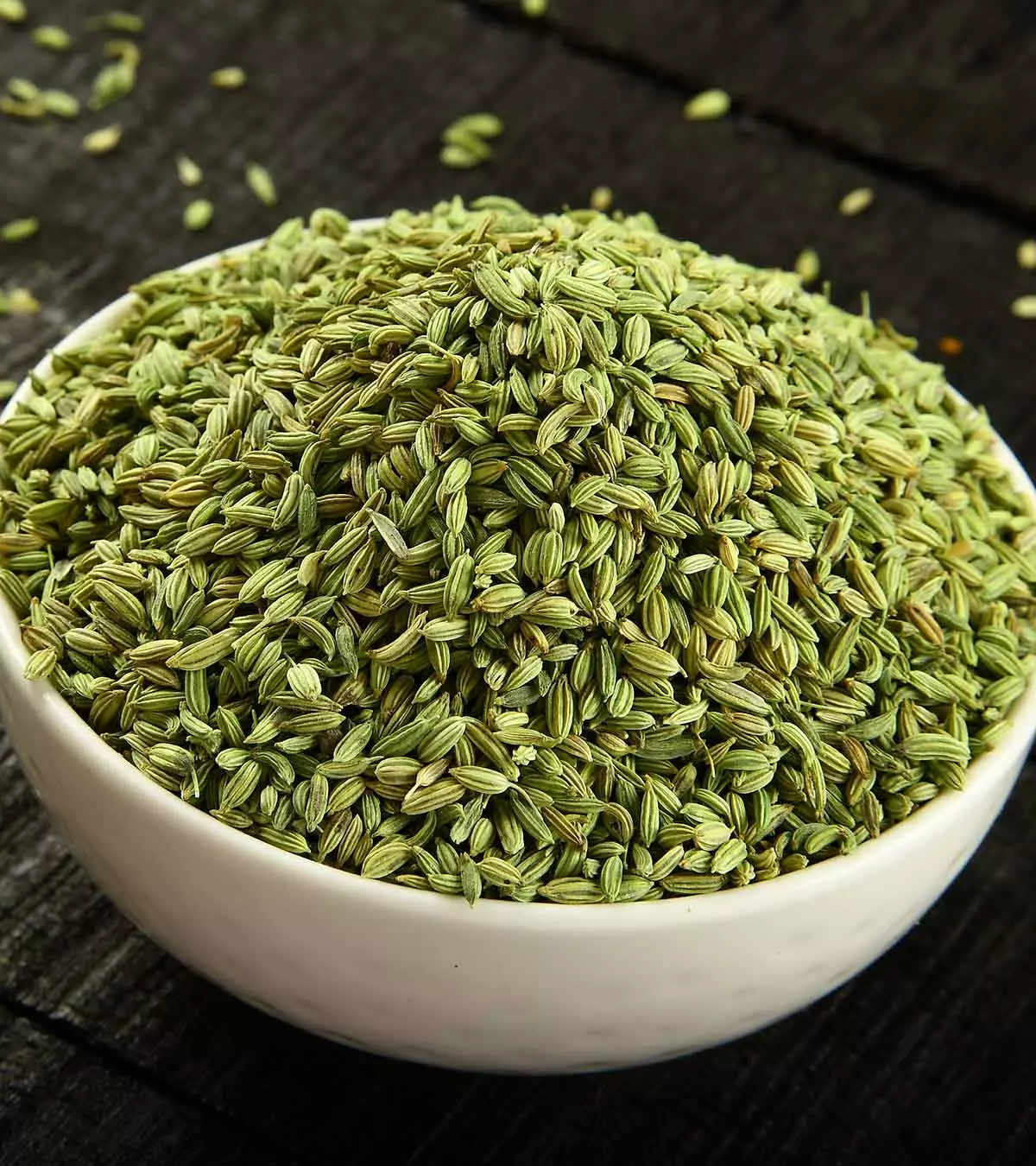
Fennel seeds come from the fennel plant (Foeniculum vulgare), an aromatic herb from the same botanical family as carrots. Fennel seeds for babies could be beneficial in promoting digestion, fighting infections, and improving overall health.
Fennel seeds are known for their culinary and therapeutic benefits. The seeds have been used to treat various illnesses affecting the reproductive, digestive, and respiratory systems for ages.
This post discusses the safety and potential health benefits of fennel seeds for babies. We also provide recipes to prepare dishes with fennel seeds for the baby.
Key Pointers
- Babies eating various solid foods can consume fennel seeds as a flavoring agent in different forms.
- Fennel seeds offer several nutrients and bioactive compounds to help alleviate colic symptoms and promote digestion in babies.
- Follow necessary precautions while purchasing and feeding fennels seeds for the baby’s safety.
When Can Babies Consume Fennel Seeds?
There is no specific age for the introduction of fennel seeds. Vegetables related to fennel, such as carrots, can be introduced at the age of six months (1). You may introduce fennel seeds as a natural flavoring substance to six-month-olds, who consume various other solids.
You may give a teaspoon or two of fennel water to babies. It will help the infant adjust to fennel’s taste and digestibility. Gradually, add fennel powder to different recipes, such as porridge, cereals, soups, and stews. Fennel powder enhances a meal’s flavor.
You may also occasionally feed fennel tea to babies. Young babies can consume a tablespoon of fennel tea after or before meals. Older babies and toddlers may be able to consume half a cup of fennel tea spread across multiple servings in a day. Giving fennel to babies is safe as long as the quantity is controlled. Consult a pediatrician to know the quantity of fennel tea you can give to your baby.
Nutritional Value Of Fennel Seeds
Fennel seed benefits are vast. Besides adding flavor and aroma to a meal, fennel seeds can also offer extensive nutrients such as vitamins A, C, and B6, niacin ,riboflaviniVitamin B2 essential for healthy skin, eyes, and nervous system. , thiamineiVitamin B1 that helps the body convert food into energy and supports nerve function. , zinc, sodium, phosphorus, proteins, and phytochemicals. One teaspoon (2g) of whole fennel seeds can provide the following nutrients to your infant (2) (3).
| Nutrients | Amount | RDA |
| Fiber, total dietary | 0.796g | – |
| Calcium, Ca | 23.9mg | 270mg |
| Iron, Fe | 0.371mg | 10mg |
| Magnesium, Mg | 7.7mg | 60mg |
| Potassium, K | 33.9mg | 700mg |
Sources: U.S. Department of Agriculture and World Health Organization
Possible Uses Of Fennel Seeds For Babies

Fennel seeds contain bioactive compounds, which may offer some long-term health benefits (4). Below are some notable benefits of fennel seeds for babies.
- Support digestion: Fennel seed water, tea, and essential oil can enhance gastric motility, improve digestion, and promote a healthy appetite (5) (6). Consumption of fennel water or tea is used as a herbal remedy for treating indigestion, bloating, farting, and gastric distension in babies. Effects are instantaneous and quite effective. Furthermore, anecdotal evidence suggests that fennel can improve the nutrient absorption and immune sensing function of the gastrointestinal tract while improving its ability to block pathogens.
- Help fight constipation: Fennel seeds are known for treating baby constipation by enhancing gastric motility (4) (7). Fennel seed water and tea are common remedies for relieving constipation in traditional and alternative medicine.
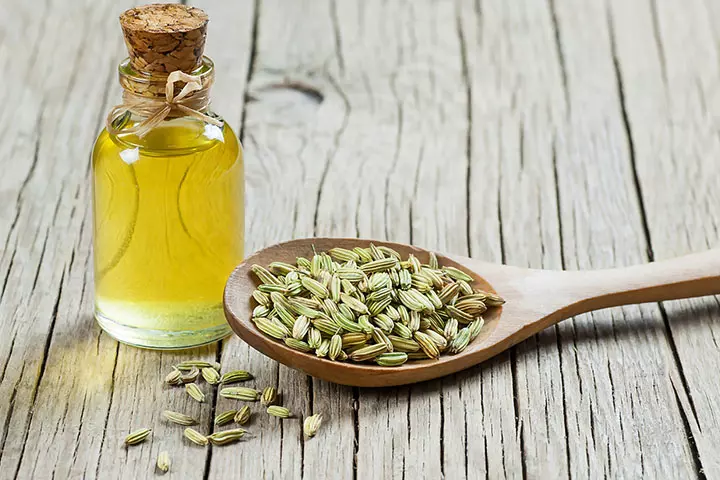
Image: iStock
- Relieve colic symptoms: Fennel seed oil emulsion has shown effectiveness in reducing the symptoms of infantile colic (8) (9). However, fennel oil may contain some compounds, such as estragoleiA natural flavoring agent commonly found in spices and for its fragrant inducing and anti-inflammatory activities. , inappropriate for a baby’s health (10). Consult a doctor before serving fennel oil to a baby. In such a case fennel water can be quite effective in reducing the painful cramps in the baby.
- Might relieve cough: Warm fennel water and tea are used as home remedies to manage symptoms of respiratory ailments, such as cough and bronchitis. Anethole and fenchone are compounds with expectorantiMedicine that increases the respiratory secretions to clear out mucus through coughing. properties found in fennel oil (5) (6). Including fennel in your baby’s diet may offer natural relief during respiratory infections, supporting better breathing and soothing discomfort.
- Overall health: Studies have noted that fennel seeds have antibacterial, antimicrobial, antifungal, anti-inflammatory, antioxidantiA natural substance combating the free radical-induced cell damage. , and hepatoprotectiveiAgents that protect the liver from any damage and improve its function. effects that can benefit health in the long run (10) (11) (12).
Consult a pediatrician before using fennel seeds for any therapeutic or medicinal purposes.
 Quick fact
Quick factPrecautions To Take When Feeding Fennel Seeds To Babies
Here are some tips to follow while feeding fennel to babies and toddlers.
- Buy organic fennel seeds and fennel powder from a reputed store.
- Do not feed whole fennel seeds to babies as they can be a choking hazard. Instead, use crushed fennel seeds in purees and smoothies during the weaning stage.
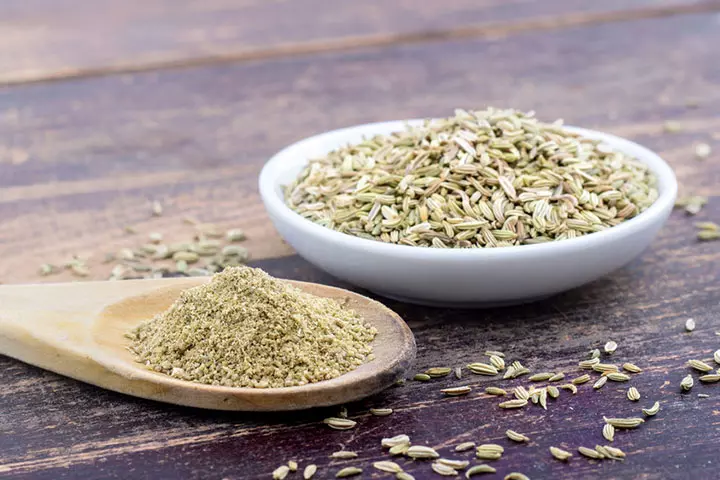
- If the baby shows sensitivity or intolerance after ingesting fennel in any form, discontinue feeding it.
- Fennel seed allergy is rare but possible. The allergy symptoms include hivesiA skin condition causing rashes and irritations due to food or medicinal reaction. , swelling of the mouth, itching, abdominal pain, vomiting, and diarrhea. These symptoms may appear immediately after ingesting or touching fennel. Hence start with a small quantity and wait for a couple of days to check any signs of allergies.
- If the baby has a family history of allergies to certain pollens and foods (parsley, carrot, celery, parsnip, etc.) belonging to the Apiaceae family (13), consult a doctor before introducing fennel.
- Fennel seed can interact with several medicines, such as antibiotics (14). Consult a pediatrician about fennel seed use if your baby is on any medications.
- While preparing fennel water or tea, take precaution to boil on a low flame and gradually to avoid evaporation of antioxidants.
 Point to consider
Point to considerFennel Seed Recipes For Babies
Here are some easy-to-consume fennel seed recipes for babies and toddlers.
1. Fennel water
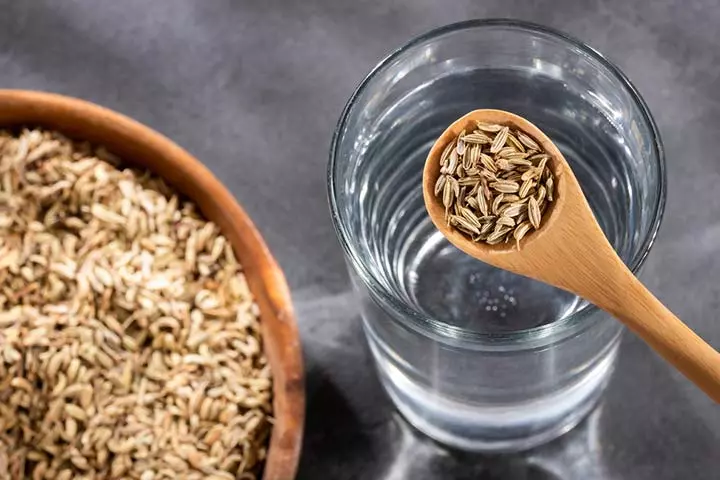
You will need:
- 1 cup clean drinking water
- 1tsp fennel seeds
How to
:
- Soak a teaspoon of fennel seeds in a cup of water overnight.
- The next day, filter the water into a bowl and feed the baby a teaspoon or as directed by your pediatrician. Do not serve more than a tablespoon a day to younger babies.
2. Fennel tea

You will need:
- 1 cup water
- 1tsp fennel seeds (crushed)
How to
:
- Boil water into a saucepan over medium heat and add fennel seeds.
- Switch off the flame and cover the pan. Let the seeds steep in the water for 15 to 20 minutes.
- Strain the tea into a cup, let it cool, and feed it to your baby.
For toddlers, you can serve fennel seed powder by adding it to milk and other dairy products, such as yogurt.
3. Potato Fennel Puree
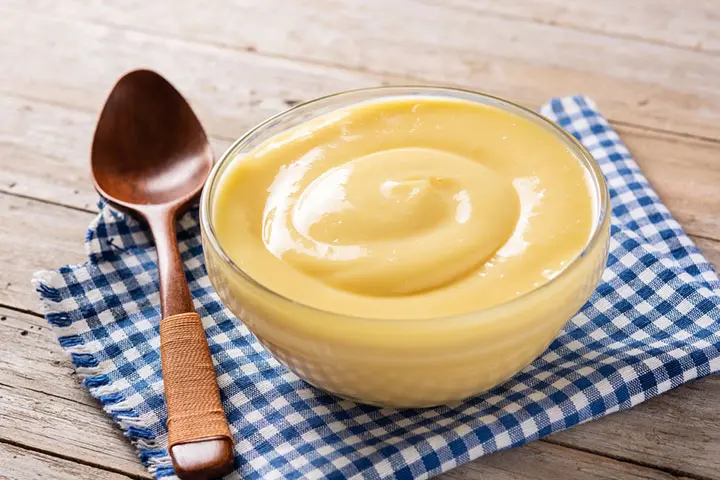
You will need:
- Potato
- Fennel seeds
- Olive oil
How to:
- Cook the peeled and cubed potato with the fennel seeds by steaming or boiling them together.
- After cooking, blend the mixture until it reaches a smooth consistency, then incorporate some olive oil for extra flavor.
- Feed it to your baby.
Frequently Asked Questions
1. Does fennel make babies sleepy?
Fennel is often used in folk medicine as a remedy for insomnia (4). While adults may experience fennel’s therapeutic effects, there is no research on its effects on babies. Consult a doctor before giving the baby any fennel-containing tonic for sleep.
2. How often can I give my baby fennel tea?
According to the European Scientific Cooperative on Phytotherapy (ESCOP), 1-2 g of fennel seeds can be grounded and given to babies as fennel tea at divided doses 2-3 times a day (15). However, this dosage may vary as per the baby’s age, and you must get a pediatrician’s opinion first.
Fennel seeds for babies may be used as a flavoring agent once they start eating solids. This aromatic and flavorful spice contains several nutrients and beneficial phytochemicalsi Bioactive compounds in plants with antioxidant and antimicrobial properties. . It is also considered effective in improving digestion and treating constipation. It is better to start with small quantities of fennel water before adding fennel tea or powdered fennel seeds to your infant care diet. Use the crushed and powdered form, as whole seeds may be a choking hazard. Look out for signs of intolerance or allergic reactions and discontinue use if you observe any.
Infographic: How To Make Fennel Seed Powder And Use It For Baby Food
Fennel is a flavorful herb that can be used for babies in different forms. Our infographic shares simple steps you can follow to make fennel seeds powder at home. It also shares different ways to use fennel seeds powder to prepare delectable baby foods.

Illustration: Momjunction Design Team
Learn how to make a soothing and healthy fennel seed tea for your bottle-fed baby. Follow the simple steps in the video given below to make this delicious tea!
References
1. First Foods For Baby; UNICEF
2. Spices, fennel seed, FDC ID: 171323; Fooddata Central; USDA
3. Feeding and nutrition of infants and young children; WHO
4. Shamkant B. Badgujar et al.; Foeniculum vulgare Mill: A Review of Its Botany, Phytochemistry, Pharmacology, Contemporary Application, and Toxicology; NCBI
5. S. K. Malhotra et al.; Fennel and fennel seed; Researchgate
6. Gurmeet Singh Sarla; Saunf: Do we really need fennel seeds after a meal?; Reasearchgate
7. Qabz (Constipation); National Health Portal; MoHFW, India
8. Mahtab Attarha et al.; Effect Of Fennel Essence And Gripe Water Syrup On Infantile Colic; BMJ
9. Irina Alexandrovich et al.; The effect of fennel (Foeniculum Vulgare) seed oil emulsion in infantile colic: a randomized, placebo-controlled study; NCBI
10. Manzoor A.Rather et al.; Foeniculum vulgare: A comprehensive review of its traditional use, phytochemistry, pharmacology, and safety; Science Direct
11. Wesam Kooti et al.; Therapeutic and pharmacological potential of Foeniculum vulgare Mill: a review; Researchgate
12. Qing Liu; Antibacterial and Antifungal Activities of Spices; NCBI
13. Fennel; Drugs and Lactation Database; NCBI
14. M Zhu et al.; Effect of oral administration of fennel (Foeniculum vulgare) on ciprofloxacin absorption and disposition in the rat; NCBI
15. Assessment Report On Foeniculum Vulgare Miller; European Medicines Agency
Community Experiences
Join the conversation and become a part of our nurturing community! Share your stories, experiences, and insights to connect with fellow parents.
Read full bio of Seeemaa Budhraja
Read full bio of Swati Patwal
Read full bio of Rohit Garoo
Read full bio of Ghazia Shah







